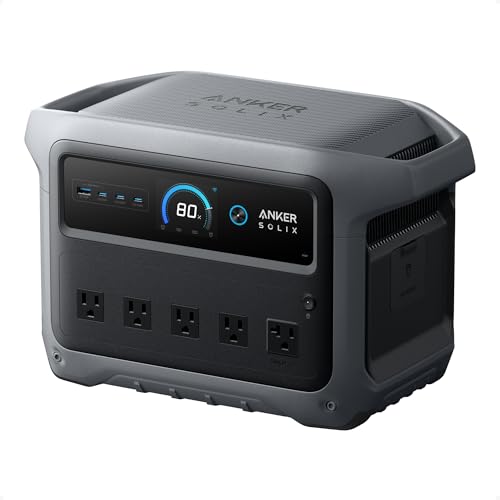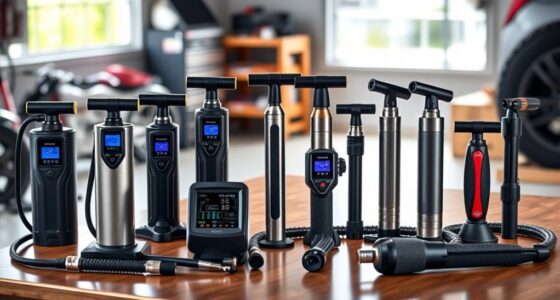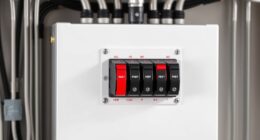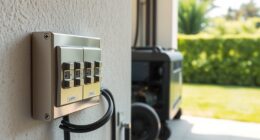If you’re looking for the best portable power stations for home backup in 2025, I recommend considering units with capacities from around 600W to over 3kWh, featuring lithium or LiFePO4 batteries for long life. Look for models with fast recharging, multiple outlets, and solar compatibility. Portability varies, so weigh size and weight against your needs. Curious to find the perfect fit for your home or outdoor adventures? Keep exploring to discover the top options that suit your needs best.
Key Takeaways
- Look for models with high capacity (over 1,000Wh) and robust power output (up to 2200W) for reliable home backup.
- Prioritize units with fast recharging times and multiple recharging options, including solar and AC.
- Choose portable, lightweight designs with durable handles or wheels for easy mobility during outages.
- Consider expandability features, like additional batteries, to increase capacity for longer backup durations.
- Ensure compatibility with essential home devices and appliances, including refrigerators and medical equipment.
Portable Power Station 600W 293Wh Camping Lithium Battery
If you’re looking for a reliable power backup during outages or outdoor adventures, the Portable Power Station 600W 293Wh from BailiBatt is an excellent choice. It offers a 600W pure sine wave AC outlet, supporting most small appliances and devices up to 600W. The 293Wh lithium battery supports over 1500 charge cycles, ensuring long-term use. Weighing just 7.7 pounds, it’s lightweight and easy to carry. With seven versatile output ports, including USB-C, fast-charge ports, and a car port, it’s compatible with laptops, cameras, and drones. Built-in safety features protect your devices, while the clear LCD helps monitor performance easily.
Best For: outdoor enthusiasts, campers, and emergency preparedness individuals seeking reliable, portable power for small appliances and electronic devices.
Pros:
- Lightweight and compact design weighing only 7.7 pounds for easy portability.
- Supports over 1500 charge cycles, ensuring long-term reliability.
- Multiple output ports including USB-C, fast-charge, and car port for versatile device compatibility.
Cons:
- Car charger cable not included, requiring an additional purchase.
- Limited to 600W output, unsuitable for high-power appliances.
- Regular recharging needed every 1-2 months if unused, to maintain battery health.
EF ECOFLOW Portable Power Station DELTA 2, 1024Wh LiFePO4 Battery
The EF ECOFLOW Portable Power Station DELTA 2 with its 1024Wh LiFePO4 battery is an excellent choice for anyone seeking reliable home backup power, especially during outages or emergencies. Its expandable design allows you to increase capacity up to 3kWh with additional batteries, making it versatile for various needs. Supporting a 1800W AC output, it can power most household appliances, and the fast-charging feature gets you from 0 to 80% in just 50 minutes. With multiple charging options, including solar input up to 500W, plus a long-lasting battery life of over 3000 cycles, it’s built for years of dependable use.
Best For: homeowners, outdoor enthusiasts, and off-grid dwellers seeking a reliable, expandable portable power solution for backup, camping, or RV use.
Pros:
- Large 1024Wh LiFePO4 battery with over 3000+ cycles for long-lasting performance
- Supports up to 1800W AC output, powering most household appliances with ease
- Fast charging capabilities: 0-80% in 50 minutes and solar input up to 500W for green energy
Cons:
- Expandability to 3kWh requires additional batteries, increasing overall cost
- Heavier and bulkier compared to smaller, less powerful portable power stations
- Limited to 500W solar input, which may restrict rapid outdoor charging in some situations
Anker SOLIX C1000 Portable Power Station (Optional Solar Panel)
For those seeking a reliable home backup solution, the Anker SOLIX C1000 Portable Power Station stands out with its powerful 1800W continuous output and rapid recharge capabilities. Its 1056Wh LiFePO4 battery offers long-term durability with 3,000 cycles over 10 years, ensuring consistent performance. Thanks to UltraFast recharging, it reaches 80% in just 43 minutes and fully recharges in under an hour, making it perfect for emergencies. Weighing only 27.6 pounds, it’s portable enough for outdoor use or home backup. With 11 versatile outlets and optional solar panel support, it’s a flexible, sustainable power solution for various needs.
Best For: outdoor enthusiasts, homeowners seeking reliable backup power, and those interested in sustainable energy solutions.
Pros:
- Rapid UltraFast recharging from 0 to 80% in just 43 minutes
- Long-lasting LiFePO4 battery with 3,000 cycles over 10 years
- Compact, portable design weighing only 27.6 pounds with versatile outlet options
Cons:
- Supports solar input up to 600W, which may be limiting for large-scale off-grid use
- Slightly higher price point compared to basic portable power stations
- Operating temperature range (68–122°F) may restrict use in extreme cold or heat
Anker SOLIX C1000 Gen 2 Portable Power Station
Designed to keep essential devices running during power outages, the Anker SOLIX C1000 Gen 2 Portable Power Station stands out with its impressive 2,000W continuous power output and quick recharge capabilities. Its 1,024Wh LiFePO4 battery supports up to 10 devices simultaneously, making it ideal for emergencies, remote work, or off-grid living. Recharging is lightning-fast—just 49 minutes via HyperFlash tech at 1,600W—or in 1.8 hours with a 600W solar panel. Compact and lightweight, it’s perfect for on-the-go use, whether camping, RVing, or in a tiny home. Built for durability, it offers over 4,000 cycles and a 10-year lifespan.
Best For: individuals seeking a reliable, portable power solution for emergency backup, off-grid living, camping, or remote work environments.
Pros:
- High power capacity with 2,000W continuous output and 1,024Wh battery
- Fast recharge in just 49 minutes using HyperFlash technology
- Supports up to 10 devices simultaneously, ideal for multiple appliances and gadgets
Cons:
- Relatively higher price point compared to basic portable power stations
- Limited solar input capacity may extend recharging time in cloudy conditions
- Bulkier than smaller, less powerful models, which could impact portability for some users
Jackery Explorer 1000 v2 Portable Power Station
If you’re seeking a reliable backup power source for your home during outages or emergencies, the Jackery Explorer 1000 v2 stands out with its massive 1070Wh LiFePO4 battery. It offers a 1500W continuous AC output, with a surge capacity of 3000W, enough to power appliances like fridges, AC units, and electric pots. Weighing just 23.8 pounds with a foldable handle, it’s portable and perfect for outdoor use. It supports solar charging through compatible Jackery panels and features rapid charging—going from 0% to 100% in about 1.7 hours. Its durable battery guarantees over 10 years of reliable power, making it a top choice for home backup.
Best For: outdoor enthusiasts, homeowners seeking reliable emergency backup, and RV travelers needing portable power solutions.
Pros:
- High-capacity 1070Wh LiFePO4 battery with over 10 years of lifespan and 4,000+ charge cycles
- Rapid charging from 0% to 100% in approximately 1.7 hours with advanced ChargeShield 2.0 technology
- Multiple versatile outlets including AC, USB-C, USB-A, and car port, supporting a wide range of devices and appliances
Cons:
- Solar charging is only compatible with Jackery solar panels, which are sold separately
- Relatively heavy at 23.8 pounds, which may impact portability for some users
- Limited to a maximum of 1500W continuous AC output, restricting use with high-power appliances
Jackery Explorer 2000 v2 Portable Power Station
The Jackery Explorer 2000 v2 stands out as an ideal choice for those seeking reliable home backup power, thanks to its impressive 2042Wh LiFePO4 battery and 2200W continuous AC output. Its compact, lightweight design weighs just 39.5 pounds, making it 41% lighter and 34% smaller than typical 2kWh units. Equipped with advanced Cell-to-Body technology, it guarantees safety, stability, and space optimization. It offers fast charging—0-80% in 66 minutes via AC—and solar charging in as little as six hours. Quiet operation, long battery lifespan, and multiple outlets make it perfect for emergencies, camping, or small business needs, all while maintaining eco-friendliness.
Best For: Homeowners, outdoor enthusiasts, and small businesses seeking reliable, portable backup power with fast charging and eco-friendly features.
Pros:
- High-capacity 2042Wh LiFePO4 battery ensures long-lasting power for various needs.
- Compact and lightweight design (39.5 lbs) for easy portability and space saving.
- Fast charging capabilities (0-80% in 66 mins) and solar compatibility for quick recharging.
Cons:
- Cannot be delivered to PO Box addresses.
- Slightly higher initial cost compared to smaller or less feature-rich units.
- Limited to 2200W AC output, which may not support high-wattage appliances.
AFERIY P210 Portable Power Station (2400W, 2048Wh, LiFePO4 Battery)
When safeguarding your home against power outages, the AFERIY P210 Portable Power Station stands out with its impressive 2400W continuous power and 2048Wh LiFePO4 battery, making it an ideal choice for reliable backup. It supports over 3500 cycles and a 10-year lifespan, ensuring long-term durability. With pure sine wave output and surge capacity of 4800W, it’s safe for sensitive electronics. It can power up to 16 devices simultaneously through multiple outlets, including AC, USB, Type-C, and car ports. Compact and lightweight at 54 pounds, it’s perfect for home backup, camping, or emergencies, all backed by a 7-year warranty.
Best For: homeowners, campers, and emergency preparedness enthusiasts seeking reliable, long-lasting backup power for sensitive electronics and multiple devices.
Pros:
- Provides a powerful 2400W continuous output with a 2048Wh LiFePO4 battery for long-term durability and reliable backup.
- Supports up to 16 devices simultaneously via multiple outlets, including AC, USB, Type-C, and car ports.
- Features pure sine wave output with surge capacity of 4800W, ensuring safe power for sensitive electronics and appliances.
Cons:
- Heavier at 54 pounds, which may be less portable for some users.
- Slightly higher price point due to advanced features and extended warranty.
- Limited to 5+2 year warranty, which, while substantial, might be less than some competitors with longer coverage options.
Portable Power Station 300W with 230.88Wh Battery
A 300W portable power station with a 230.88Wh battery offers an ideal solution for those seeking reliable backup power during outages or outdoor activities. It supports laptops, phones, lights, fans, CPAP devices, and small appliances under 330W, making it versatile for camping or emergencies. Its compact, lightweight design enhances portability. The upgraded lithium battery with advanced BMS guarantees safety through overload, overcharge, and short-circuit protection, while dual silent fans keep temperatures safe. Multiple charging options—including AC, solar, and car—maximize convenience, and the included 40W solar panel boosts solar recharging efficiency. It’s a reliable, portable power source for various outdoor and emergency needs.
Best For: outdoor enthusiasts, campers, and emergency preparedness individuals seeking reliable portable power for small appliances and devices.
Pros:
- Supports multiple devices simultaneously with versatile ports including USB-C PD 60W and AC outlet.
- Equipped with advanced BMS and dual silent fans for enhanced safety and temperature management.
- Includes a 40W solar panel for efficient solar recharging and outdoor use.
Cons:
- Limited capacity of 230.88Wh may not power larger appliances for extended periods.
- Maximum continuous output of 330W could restrict usage for higher wattage devices.
- Solar panel charging depends on sunlight availability, which may vary in cloudy conditions.
EF ECOFLOW Solar Generator DELTA2 with 220W Solar Panel
If you’re seeking a reliable backup power solution that combines eco-friendliness with high performance, the EF ECOFLOW Solar Generator DELTA2 with 220W Solar Panel is an excellent choice. It delivers up to 500W solar input, making it perfect for off-grid use, camping, or RV trips. The 220W bifacial solar panel captures up to 25% more energy, boosting efficiency. With an 1800W continuous output, it can power most household appliances. Its LiFePO4 battery guarantees over 3,000 cycles for long-term durability. Plus, the expandable capacity up to 3kWh and versatile charging options make it a flexible, eco-friendly backup for various needs.
Best For: outdoor enthusiasts, RV travelers, and home users seeking a reliable, eco-friendly backup power solution for off-grid or emergency situations.
Pros:
- High solar input capacity of up to 500W, enabling quick and efficient charging
- Advanced LiFePO4 battery with over 3,000 cycle lifespan for long-term durability
- Expandable capacity up to 3kWh, providing flexible energy storage options
Cons:
- Solar panel and DELTA2 are shipped separately, requiring additional setup steps
- Limited to 1800W continuous output, which may not power very high-wattage appliances
- The system’s size and weight could be less portable for some users despite the carry case
EF ECOFLOW Solar Generator (DELTA Pro 3.6KWh) with Portable Solar Panel
The EF ECOFLOW DELTA Pro with its 3.6kWh capacity stands out as an ideal choice for those seeking reliable home backup during power outages or emergencies. It offers a powerful 3600Wh battery, capable of delivering 3600W AC output and supporting up to 15 outlets, including AC, USB, and DC ports. Paired with the foldable 400W solar panel, it can fully recharge in just 11 hours with one panel or 3.5 hours with three. Its durable, waterproof design makes it perfect for outdoor use, camping, or emergency scenarios. Plus, the EcoFlow app allows you to monitor and control power remotely, ensuring you stay connected when it matters most.
Best For: individuals seeking a reliable portable power solution for home backup, outdoor camping, RV use, or emergency situations.
Pros:
- High-capacity 3.6kWh battery with 3600W AC output supports a wide range of appliances and devices.
- Fast full recharge in just 11 hours with three solar panels, making it efficient for outdoor use.
- Durable, waterproof, and portable design ideal for outdoor, camping, and emergency scenarios.
Cons:
- The power station is relatively heavy at 99 pounds, which may require assistance for transportation.
- Solar panels are sold separately, potentially increasing overall cost.
- Limited to 15 outlets, which might be insufficient for larger power needs or multiple simultaneous devices.
Jackery HomePower 3000 Portable Power Station
With its 3600W continuous power output and 3072Wh capacity, the Jackery HomePower 3000 is an excellent choice for households seeking reliable backup during outages. It can power essentials like refrigerators, lights, and WiFi for up to 15 hours or keep a refrigerator running for 1-2 days. Its UL-certified UPS switches seamlessly within ≤20ms, ensuring critical devices like security systems and medical equipment stay online. Multiple ports—including AC, USB-C, USB-A, and DC—allow for simultaneous device charging. Recharging is quick, taking just 1.7 hours with hybrid power or 2.2 hours via AC. Its rugged design makes it perfect for home use and outdoor adventures.
Best For: households and outdoor enthusiasts seeking reliable, fast-charging backup power with seamless UPS functionality for critical devices during outages.
Pros:
- High continuous power output of 3600W and 3072Wh capacity for versatile home and outdoor use
- Rapid recharging in just 1.7 hours with hybrid AC/DC or 2.2 hours via AC alone
- Multiple versatile ports including AC, USB-C, USB-A, DC, and TT-30 RV outlet for simultaneous device charging
Cons:
- Relatively heavy and bulky design may impact portability for some users
- Higher initial cost compared to smaller portable power stations
- Dependence on solar or external power sources for optimal eco-friendly recharging
ALLWEI Portable Power Station 300W
The ALLWEI Portable Power Station 300W stands out as an ideal choice for anyone seeking reliable home backup during outages or emergencies. With a 280Wh capacity and 300W rated power, it can run devices like phones, laptops, CPAP machines, and small appliances. Its compact design (just 6 pounds) makes it easy to carry, while 9 ports—including AC outlets, USB-C, and DC—offer versatile connectivity. Charging options include AC, car, and solar, with efficient MPPT solar input. Built-in safety features and a long battery life—supporting 1500 cycles—ensure dependable performance. Whether camping or during power outages, this portable generator delivers peace of mind when you need it most.
Best For: homeowners, campers, and outdoor enthusiasts seeking a reliable, portable power source for emergencies, camping, or RV trips.
Pros:
- Compact and lightweight design for easy portability
- Multiple charging options including AC, car, and solar power
- Long-lasting battery life supporting up to 1500 cycles
Cons:
- Solar panel sold separately, requiring additional purchase
- Limited to 300W continuous power, not suitable for high-wattage appliances
- Fan noise during cooling may be noticeable during operation
MARBERO Portable Power Station (88Wh, Solar Generator, AC Outlet, 120W Peak)
If you’re looking for a compact, reliable backup power source, the MARBERO Portable Power Station stands out with its 88Wh lithium battery and multiple output options. Weighing just 3.2 pounds and measuring 6.5 x 4.6 x 3.1 inches, it’s perfect for camping, emergencies, or outdoor activities. It features AC outlets, USB, USB-C PD ports, and a car DC output, supporting multiple devices simultaneously. It charges quickly—up to 80% in 2 hours—and is compatible with solar panels for off-grid use. Its built-in safety features, cooling vents, and LED lights make it durable and practical, especially during power outages or outdoor adventures.
Best For: outdoor enthusiasts, campers, and emergency preparedness individuals seeking a lightweight, reliable backup power source with versatile charging options.
Pros:
- Compact and lightweight design for portability and easy transportation
- Multiple output ports including AC, USB, and car DC for versatile device charging
- Fast charging capability, reaching 80% in just 2 hours, with solar panel compatibility for off-grid use
Cons:
- Limited battery capacity of 88Wh may not power larger appliances for extended periods
- Peak power of 120W restricts usage to smaller devices and appliances
- Absence of built-in wheels or handles may make carrying over long distances less convenient
Jackery Portable Power Station Explorer 300
For anyone seeking a compact, reliable backup power source for emergencies or outdoor adventures, the Jackery Portable Power Station Explorer 300 stands out. It packs a 293Wh lithium-ion battery into a lightweight 7.1-pound design, making it easy to carry. With two AC outlets, a USB-C port, fast charge, USB-A, and a DC car port, it can power up to six devices simultaneously. It recharges quickly—80% in just two hours via wall outlet or with solar panels thanks to MPPT technology. Its pure sine wave outlets guarantee safe power for sensitive electronics like laptops and cameras, making it perfect for off-grid use.
Best For: outdoor enthusiasts, campers, and emergency preparedness individuals seeking a portable, reliable power source for multiple devices in off-grid or emergency situations.
Pros:
- Compact and lightweight design (7.1 pounds) for easy portability
- Multiple output options including AC, USB-C, USB-A, and DC car port to power various devices simultaneously
- Fast recharging capabilities with wall outlet (80% in 2 hours) and solar compatibility using MPPT technology
Cons:
- Limited to 293Wh capacity, which may not support high-power appliances for extended periods
- Solar panel sold separately, requiring additional purchase for solar recharging
- No built-in wireless charging feature for added convenience
Portable Power Station 266Wh, 300W Lithium Battery for Camping & Emergency
When you need reliable power on the go or during emergencies, the Portable Power Station 266Wh, 300W Lithium Battery stands out as an ideal solution. Its high-capacity 266.4Wh battery can power laptops, smartphones, and small electronics simultaneously. With seven versatile output ports, including AC, USB-C, and DC, it suits camping, RV trips, or backup home use. The durable, compact design makes it easy to carry anywhere. Safety features like BMS protection and a clear LCD display guarantee peace of mind. Plus, the built-in LED flashlight and emergency modes prepare you for any situation, making it a dependable portable power source wherever you need it most.
Best For: outdoor enthusiasts, campers, and emergency preparedness users seeking reliable portable power solutions.
Pros:
- High-capacity 266.4Wh lithium battery supports multiple devices simultaneously
- Versatile output options including AC, USB-C, and DC ports for various electronics
- Compact, durable design with safety features like BMS protection and emergency modes
Cons:
- Limited maximum load of 300W may not power larger appliances
- Requires periodic recharging to maintain optimal performance
- May be heavier or bulkier compared to smaller portable chargers
Factors to Consider When Choosing a Portable Power Station for Home Backup
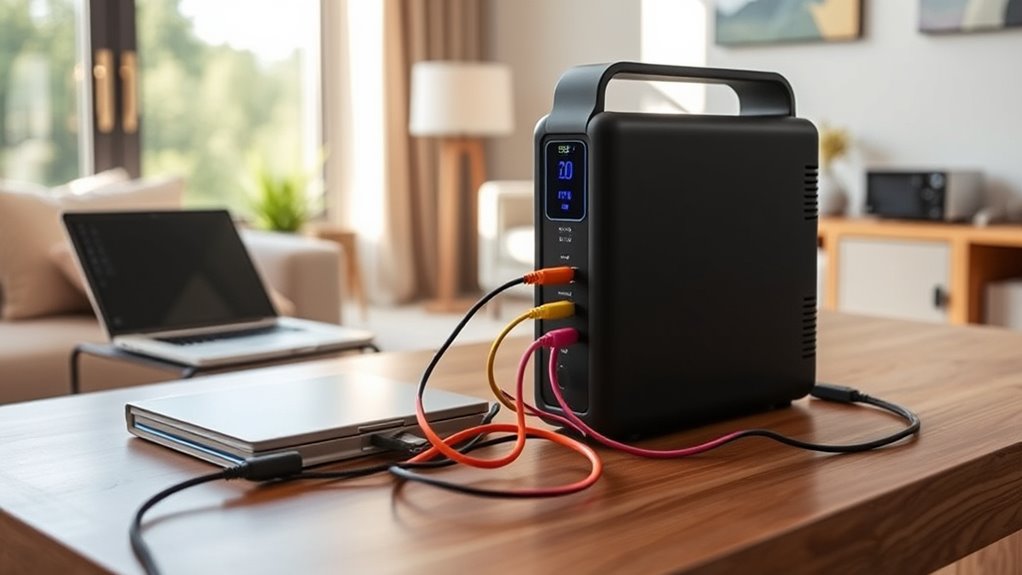
When selecting a portable power station for home backup, I consider factors like power capacity to meet my needs and the battery chemistry for reliability. I also look at the available ports, recharging options, and how portable the unit is for my space. Understanding these points helps me choose the best fit for my emergency preparedness.
Power Capacity Needs
Selecting the right portable power station hinges on accurately evaluating your power capacity needs. First, determine the total wattage of devices you want to run during an outage, which can range from 300Wh to over 3000Wh. Make sure the station can handle the surge wattage for appliances like refrigerators or pumps that require higher initial power. It’s also crucial to match the station’s capacity with your expected usage duration so you won’t need frequent recharges. For long-term backup, opt for units with higher capacity and durable batteries like LiFePO4, which support over 3000 charge cycles. Lastly, check that the continuous power output aligns with your essential appliances’ combined wattage to prevent overloads. Properly assessing these factors ensures reliable, uninterrupted backup power.
Battery Chemistry Types
Choosing the right battery chemistry for your portable power station is essential because it directly affects safety, lifespan, weight, and overall performance. Lithium-ion batteries are popular due to their high energy density and lightweight design, making them ideal for portability. Lithium Iron Phosphate (LiFePO4) batteries, on the other hand, offer a longer cycle life—often exceeding 3,000 to 4,000 cycles—and better thermal stability, which enhances safety. Lead-acid batteries are more affordable but are heavier, bulkier, and have a shorter lifespan of around 500-1,000 cycles. Although still emerging, solid-state batteries promise higher energy density, longer lifespan, and improved safety. Your choice depends on balancing factors like weight, safety, longevity, and cost for your specific backup needs.
Port Selection Options
The variety of output ports on a portable power station plays a significant role in how effectively it can support your home backup needs. I look for stations with multiple ports—AC outlets, USB-C, USB-A, and DC—to power various devices simultaneously. It’s essential that the port wattage and surge capacity meet the demands of your essential appliances, especially larger ones like refrigerators or medical devices. Fast-charging ports, such as PD 100W USB-C, help recharge your gadgets quickly during outages. I also check for dedicated ports capable of handling high-power devices, typically 600W or more, to ensure larger appliances run smoothly. Finally, having the right adapters or connectors for your specific devices allows for future expansion and flexibility.
Recharging Methods
To guarantee your portable power station keeps your home running during outages, it’s vital to take into account its recharging options. I look for models that support multiple methods, like AC wall outlets, solar panels, and vehicle adapters, for maximum flexibility. Fast recharging is a big plus—some units can reach 80% capacity in just 43 minutes, saving time during emergencies. Compatibility with solar panels is also essential; I check wattage limits and MPPT controllers to ensure efficient outdoor charging. High-wattage support, such as 600W or more, helps me recharge quickly when needed. I prefer stations that can be fully recharged in under two hours, so I stay prepared without long waits. Reliable, versatile recharging methods keep my power station ready whenever I need it most.
Portability and Size
When selecting a portable power station for home backup, I pay close attention to its size and weight because these factors determine how easy it is to transport and store. Lighter units, under 10 pounds, are ideal for emergencies or outdoor use since they’re simple to carry. Compact sizes make storage effortless, fitting neatly in cabinets or closets without cluttering space. I also consider the form factor—balancing size and capacity—to ensure the station fits my available space while providing enough power. Features like handles, wheels, or ergonomic designs make moving the unit more manageable, especially during power outages. Keep in mind, smaller stations might have limited capacity, so I assess my power needs carefully to find the right balance between portability and performance.
Frequently Asked Questions
How Long Can a Portable Power Station Run Essential Home Appliances?
A portable power station can typically run essential home appliances for several hours, depending on the device’s wattage and the station’s capacity. For example, a 500Wh unit might power a refrigerator for around 8-10 hours or a few lights and chargers for a longer period. I always check the wattage of my appliances and match them to the power station’s specs to guarantee reliable backup when needed.
Are Portable Power Stations Safe for Indoor Home Use?
Yes, portable power stations are generally safe for indoor use when you follow the manufacturer’s guidelines. I always make sure proper ventilation and avoid overloading outlets. Using a quality power station with built-in safety features like surge protection and automatic shutoff gives me peace of mind. It’s crucial to keep the device dry and away from moisture. With these precautions, I feel confident powering essential devices indoors during outages.
Can Portable Power Stations Be Recharged With Household Outlets?
Yes, portable power stations can be recharged with household outlets. I simply plug them into a standard wall socket, and they start charging. Most models have built-in AC outlets or adapters for easy connection. It’s convenient because I can keep my power station topped up indoors, ensuring I have reliable backup power whenever I need it. Just make sure to follow the manufacturer’s instructions for safe and efficient recharging.
What Maintenance Is Required for Lifepo4 Battery-Powered Stations?
Wondering about maintenance for LiFePO4 battery-powered stations? I’ll tell you, it’s surprisingly simple. You should keep the batteries charged between 20% and 80%, avoid deep discharges, and store them in a cool, dry place. Regularly check for any signs of swelling or corrosion, and keep terminals clean. With just a little care, these stations run smoothly and last longer, ensuring you’re always powered when it counts.
Do Portable Power Stations Have Surge Protection for Sensitive Devices?
Yes, portable power stations typically include surge protection for sensitive devices. I’ve found that most models feature built-in safeguards that prevent voltage spikes from damaging electronics like laptops or medical equipment. It’s essential to check the specifications, but generally, these stations are designed to provide clean, stable power. This gives me peace of mind knowing my sensitive gadgets are protected during power fluctuations or outages.
Conclusion
Choosing the right portable power station is like planting a seed in your home’s safety garden—nurturing resilience and peace of mind. When you pick a dependable source of energy, you’re cultivating a beacon of hope during outages. Remember, it’s not just about watts or batteries, but about empowering your world with a spark that never fades. Stay prepared, and let your backup power be the steady lighthouse guiding you through any storm.






